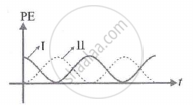Advertisements
Advertisements
प्रश्न
The displacement of a particle performing simple harmonic motion is `1/3` rd of its amplitude. What fraction of total energy will be its kinetic energy?
उत्तर
Given:
`x = A/3`
To find:
Fraction of T. E. = ?
Formula:
Total energy (T. E.) = `1/2 kA^2` ...(i)
Kinetic energy (K. E.) = `1/2 k (A^2 - x^2)` ...(ii)
Putting `x = A/3`
∴ K. E. = `1/2K[A^2 - (A/3)^2]`
= `1/2 KA^2[1 - 1/9]`
= `1/2KA^2(8/9)`
∴ K. E. = `8/18 KA^2` ...(iii)
Dividing equation (iii) and (i)
`("K. E.")/(T. E.") = (8/18 KA^2)/(1/2 KA^2)`
`("K. E.")/(T. E.") = 8/18 xx 2/1`
`("K. E.")/(T. E.") = 8/9`
APPEARS IN
संबंधित प्रश्न
Show that a linear S.H.M. is the projection of a U.C.M. along any of its diameter.
Two parallel S.H.M.s represented by `"x"_1 = 5 sin(4π"t" + π//3)` cm and `"x"_2 = 3sin (4π"t" + π//4)` cm are superposed on a particle. Determine the amplitude and epoch of the resultant S.H.M.
Define linear S.H.M.
The equation of a simple harmonic motion is given by, x = 8 sin (8πt) + 6 cos (8πt), the initial phase angle is ______
At extreme positions of a particle executing simple harmonic motion, ______
In a spring-block system, length of the spring is increased by 5%. The time period will ____________.
A particle is performing a linear simple harmonic motion of amplitude 'A'. When it is midway between its mean and extreme position, the magnitudes of its velocity and acceleration are equal. What is the periodic time of the motion?
A particle executes simple harmonic motion and is located at x = a, b, and c at times t0, 2t0, and 3t0 respectively. The frequency of the oscillation is ______.
For a particle executing simple harmonic motion, which of the following statements is NOT correct?
A simple pendulum performs simple harmonic motion about x = 0 with an amplitude A and time period T. The speed of the pendulum at x =A/2 will be ____________.
The velocities of a particle performing linear S.H.M are 0.13 m/s and 0.12 m/s, when it is at 0.12 m and 0.13 m from the mean position respectively. If the body starts from mean position, the equation of motion is ____________.
The graph between restoring force and time in case of S.H.M is ______.
A particle executes simple harmonic motion with amplitude 'A' and period 'T'. If it is halfway between mean position and extreme position, then its speed at that point is ______.
Two simple harmonic motions are represented by the equations y1 = 0.1 sin `(100pi"t"+pi/3)` and y1 = 0.1 cos πt.
The phase difference of the velocity of particle 1 with respect to the velocity of particle 2 is ______.
A particle is executing simple harmonic motion with amplitude A. When the ratio of its kinetic energy to the potential energy is `1/4`, its displacement from its mean position is ______.
For a particle executing SHM the displacement x is given by x = A cos ωt. Identify the graph which represents the variation of potential energy (P.E.) as a function of time t and displacement x.


For a particle performing linear S.H.M., its average speed over one oscillation is ______. (a = amplitude of S.H.M., n = frequency of oscillation)
If a body is executing simple harmonic motion, then ______.
Two simple harmonic motion are represented by the equations, y1 = 10 sin `(3pi"t"+pi/4)` and y2 = 5`(3sin3pi"t"+sqrt3cos3pi"t")`. Their amplitudes are in the ratio of ______.
What do you know about restoring force?
